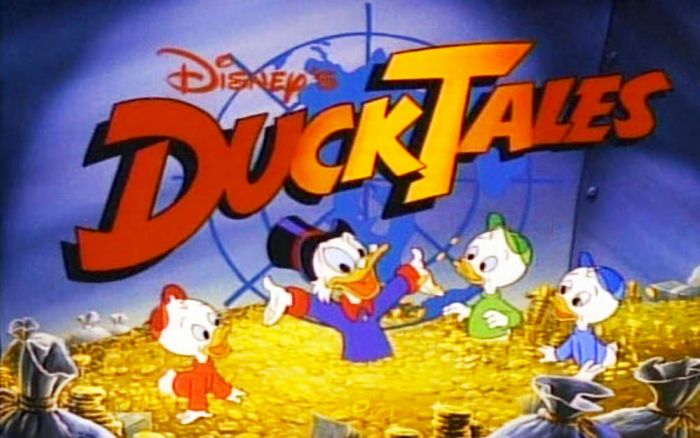Reading: Kanye West, “Blurred Lines,” Bill Watterson, CIA iPhone Hacking, DuckTales, Loving Uncool Songs, and More

Is there a figure in pop culture more polarizing than Kanye West? Everyone seems to love to hate West and his award show shenanigans and arrogant announcements. However, Cray Allred insists that there’s a better way to deal with Kanye. “People don’t know that they believe in a caricature of Kanye West. The entitled, self-obsessed hack that he’s known as wouldn’t sit through interviews with people who joke about his wife’s sex tape, repeatedly cop to his mistakes, or work hard to give upcoming talent opportunities to thrive.”
Speaking of hate, Robin Thicke’s “Blurred Lines” has received a lot of hate, and understandably so. However, even if you despise Thicke’s music, you should be concerned about the recent court ruling that found him guilty of copyright infringement. (If you care about pop music and innovation, that is.) “If vibes are now considered intellectual property, let us swiftly prepare for every idiom of popular music to go crashing into juridical oblivion. Because music is a continuum of ungovernable hybridity, a dialogue between generations where the aesthetic inheritance gets handed down and passed around in every direction. To try and adjudicate influence seems as impossible as it does insane. Is that the precedent being set here?”

Even though he abandoned Christianity years ago, David Bazan can’t stop singing about religion. “When he still called himself a Christian, Bazan only sang a handful of Jesus-y songs, but since his religious defection, he seems to find it hard to sing about anything else. ‘What to do with Bazan’ has always been genuinely troubling, not so much because he’s a doubter, but because he’s such good artist. The older he gets, the more human folly he observes; the more folly, the more shiny idols there are to swing at. His work is usually pretty brutal, so poignant and unflinching that there are times it literally keeps me up at night, but it’s still worth my time, attention, and money because it remains so piercingly true.”
The Washington Post has posted an excerpt of their interview with Bill Watterson, the reclusive creator of the beloved Calvin & Hobbes comic strip. “I honestly assumed that the books would go out of print within a few years, once they didn’t have the strip in the newspaper to create the readership for them. But people kept buying the books anyway, and now parents are showing them to their kids, and a new generation is coming up reading the strip. That’s something I never anticipated at all.”

John Pavlus really, really, really hates URLs. “The Uniform Resource Locator has been the user-interface lingua franca of the internet for decades. A browser window just wouldn’t look right without it up there at the top. But as the web has matured into a GUI-driven, mobile-first, app-serving consumer operating system in its own right, the URL stubbornly persists as an arcane, command-line-esque relic of the internet’s ultra-geeky origins. Why?”
Considering that the Web is a global medium, what does web design look like in Japan? “Essentially, most Japanese websites are going to be designed to cater to the reassurance needed by their consumers. Therefore they tend to be chock-a-block with information, buttons, and boxes, laden with bright colors to hold attention and organize the chaos, provide reassurance and gain the trust of the largest buying demographic segments of a society whose GDP is 60% consumption. If you build it they will not necessarily come. But if you build it the right way, they will never leave.”

Some folks are willing to pay up to $1,000 for pristine “hot stamper” vinyl copies of their favorite recordings. “It’s tempting to dismiss hot stampers as pseudoscience, like cryogenically treated speaker cables, power amp fuses zapped with Tesla coils, and every other confidence scheme devised to separate affluent middle-aged audiophiles from the contents of their wallets. Talk to enough studio engineers and record plant technicians, though, and it becomes apparent that the aural disparity between records that Tom Port prattles on about really does exist.”
And finally, Steven Greydanus contends that there’s only one way to read C.S. Lewis’ Chronicles of Narnia. “Needless to say, a kind note to a young fan is hardly evidence that Lewis really preferred the chronological order; in any case, I’ve never met a real Lewis fan who agreed. Certainly I consider the chronological numbering system a travesty, since I maintain that the only right way to discover the Narnian world is the way Lewis “discovered” it, which is basically (with a caveat or two; see below) the original publishing order.”

The government is doing their darndest to hack your iPhones and iPads. “U.S. intelligence has spent considerable time and resources trying to find security vulnerabilities in Apple’s encryption technology, and, more broadly, in its products, which can be leveraged to install surveillance software on iPhones and Macbooks. ‘The exploitation of security flaws is a high-priority area for the U.S. intelligence community, and such methods have only become more important as U.S. technology companies have built strong encryption into their products,’ says the ACLU’s [Christopher] Soghoian.”
Sharky Laguana proposes a better way for streaming services like Spotify to handle royalties. “In this far more equitable system the subscriber is paying to listen to certain artists, so those artists, and those artists alone, are the only ones splitting the royalties payable from that subscriber’s subscription fee. The economic model that drives Spotify is now connected to the economic model that drives artists: get more listeners, not more plays.”

Todd VanDerWerff discusses the origins and impressive legacy of DuckTales. Yes, DuckTales. “But what’s most impressive about DuckTales is just how adventurous the storytelling is. The genre switches from episode to episode. The plots are often complex and multi-layered, and the show will take a good five minutes to set up all the backstory at the top of an episode, before letting the action sequences rip. In certain episodes, there’s a deeper exploration of the characters’ motivations and morality than might be expected on a series aimed at kids… This isn’t an educational show, by any means, but there’s so much imagination in it that it’s not hard to imagine kids who watched it having their minds expanded anyway.” I was a big DuckTales fan back in the day, and when I rediscovered it on Amazon (a few days, sadly, before it was pulled), I was surprised both by how well I remembered the episodes, and how clever and enjoyable they still were.
Jeffrey Overstreet reminds us that we all love songs that others deem uncool. “What is it that makes a piece of music meaningful to you? For me, it could be anything: subject matter, wordplay, a guitar tone, a rhythm track, something unexpected, or the circumstances in which I first heard it. This is why, as a critic, I make a distinction between the albums I would rate as ‘excellent’ and the albums I would rate as ‘favorites.’ Any honest music lover knows that we love or hate songs for more than just their measures of artistic excellence.”